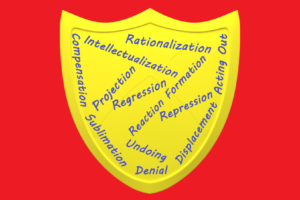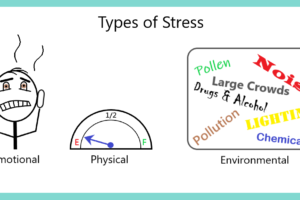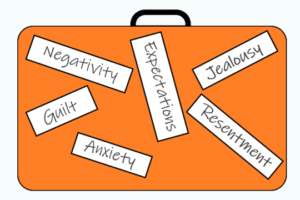Post Holiday Season Blues
With the passing of the holiday season and ongoing uncertainty about 2021, chances are good that you will experience an emotional “let down” or “post-holiday blues”. For most people these “blues” will pass fairly quickly, for example, a few hours or a few days. For others, “the blues” may last a bit longer, from a few days to a couple of weeks.
It would not be unusual for someone in 2020/2021 to experience “post-holiday blues” for the first time, or for a longer period than in years past. These reasons include the passing of over 300,000 Americans due to COVID, months of lifestyle changes, including wearing masks and limiting travel, and the loss of many holiday traditions, including not seeing family and friends.
You may be someone who says, “I don’t have post-holiday blues!” because you don’t experience any symptoms of the blues on December 26th. From my clinical experience, the post-holiday blues do not affect people until they return to work after New Year’s Day. Most people still see the week between Christmas and New Years as an extension of Christmas. They take it as an excuse to continue indulgences from before the holiday. The return to a routine is what triggers the post-holiday blues, not the passing of the holiday (Christmas).
Characteristics of Post-Holiday Blues
Post-holiday blues share many characteristics of anxiety and/or depression. The difference with post-holiday blues is that the symptoms are usually short-lived and pass without much of an intervention. Symptoms of post-holiday blues vary, but typically include some or all of the following:
• Insomnia, or sleeping more than normal for you
• Fatigue
• Low-energy
• Loss of interest in eating, or over indulging
• Irritability
• Difficulty concentrating
• Uncharacteristically turning to caffeine, alcohol or other drugs to alter your mood
• Feeling jittery or anxious
Techniques for Conquering the Post-Holiday Blues
There are techniques for improving your mood and making the return to a routine more pleasant. You are in control of your response to the post-holiday blues.
- Expect a let-down.
Let-downs occur after any period of time in which there is a change of routine. Think about how it feels to go back to school after summer vacation. Many of the symptoms listed above occur during the first few hours, days or weeks of returning to school. For most children these symptom subside as routine is reestablished.
- Don’t pack away your holiday decorations so quickly!
Maybe you don’t have to take your Christmas tree down on Christmas day. If you have a real Christmas tree and it is getting dried out, maybe you could replace it with a smaller artificial tree for another week or so.
The same goes for other holidays. Do the Halloween decorations have to go away November 1st? Do the Valentine decorations have to be gone on February 15th? Leaving decorations up for a few days after the event might extend the spirit of the holiday for you.
- Think more about seasons than events.
When I think about seasons as opposed to events, I think of Salem, MA. Salem promotes having 5 seasons: winter, spring, summer, fall & “Haunted Happenings” for all of October. There is a kick off parade early in October, fairs, and costume balls throughout the month, and fireworks over Salem Harbor on Halloween.
- Focus on taking care of what you put into your body.
Getting out of a routine frequently includes “grazing” on empty calorie celebratory foods as opposed to eating three meals a day, indulging in high calorie foods, and washing it all down with drinks like spiked eggnog or other alcohol. Returning as quickly as possible to a routine of healthy eating will do wonders for your mood.
- Practice resilience.
Resilience is the ability to bounce back from adversity (stress from the holidays). By learning how to boost your resilience through the life cycle (childhood, adulthood and in aging), you can decrease your risk of experiencing post-holiday blues. To read more about resilience, please read my article 30 Ways to Boost Your Resilience
- Relive positive memories.
For some people who experience post-holiday blues, reliving positive memories from a holiday go a long way to elevating their mood. For example, working on a photo album or scrapbooking can help to relive the positive memories. For some people, reliving positive memories can be posting on social media.
- Get moving.
Bundle up and go outside! Getting outside in the cool fresh air can do wonders for improving mood. If it is too cold to be outside, why not walk inside a mall? The idea is to get exercise, to get your blood pumping! Or if you prefer, you might try a relaxation program, or meditation or maybe even yoga.
- Look to the future.
Not dwelling on what has passed is important to decreasing post-holiday blues. Develop your “bucket list” of things you would someday like to experience. Start planning your next vacation or start planning what you will plant in the garden next summer.
Take advantage of after-holiday sales to stock up on paper goods, decorations, cards, or even gifts for next year. Every month throughout the year buy a $25.00 (or whatever you can afford) gift certificate from somewhere. When Christmas, Hanukah or even birthdays roll around, you will be prepared!
- Read Crush Your Stress: 302 Coping Skills for Managing Your Stress.
Sometimes learning new coping skills can help you with identifying and preventing stress. One of the 302 coping skills in Crush Your Stress is making a “stress management kit”. To learn more about how a stress management kit can provide you with the support you need, check out my book. Crush Your Stress: 302 Coping Skills for Managing Your Stress
- Seek professional help.
Sometimes post-holiday blues are really something else. Some people suffer from SAD or “seasonal affective disorder”. For more information on SAD, go to the National Institute of Mental Health. SAD is related to not getting enough vitamin D due to decreased sunlight in the winter. Holiday stress can also bring clinical depression or anxiety to the surface. If nothing seems to elevate your mood after a return to your routine, consider seeking professional help.
Please note: I deliberately have NOT included a New Year’s Resolution on this list of ways to conquer the post-holiday blues! Making plans to do something you really don’t feel committed to accomplishing is NOT going to help your post-holiday mood!!!
Now go take charge of your post-holiday blues!
With warmest regards,
To be notified of future posts, please enter your email address and click on the Subscribe button.











